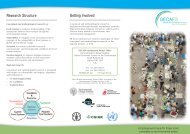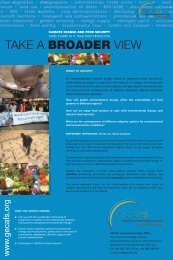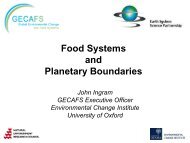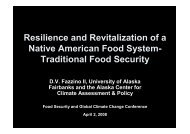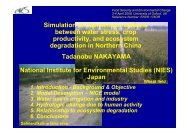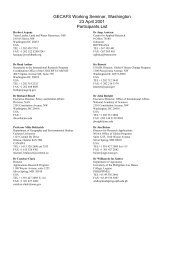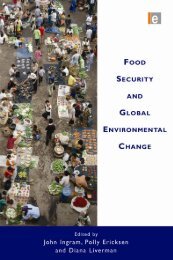From Food Production to Food Security - Global Environmental ...
From Food Production to Food Security - Global Environmental ...
From Food Production to Food Security - Global Environmental ...
- No tags were found...
Create successful ePaper yourself
Turn your PDF publications into a flip-book with our unique Google optimized e-Paper software.
define the geographical scope (i.e. spatial level) for a GEC/food security study. Regions havealso become an appropriate spatial level for organizing peacekeeping or military security(especially in the aftermath of conflict) and/or for managing shared resources. A goodexample is in the Mekong river basin where the governments of Cambodia, Lao PDR,Thailand and Vietnam formed the Mekong River Commission (MRC) <strong>to</strong> jointly manage theirshared water resources and development of the economic potential of the river. Theemergence of regional governance is an important reason <strong>to</strong> consider food security andenvironmental interactions at the regional level. In some cases, colonial powers imposednational boundaries that divided cultures and ecosystems, creating conflict or barriers, <strong>to</strong>, forexample, regional mobility in response <strong>to</strong> climate variability.Finally, intraregional trade can be significant. The friction of physical distance (e.g. transportcosts, perishability) means that, where long-distant transport infrastructure is less welldeveloped, trade is often most effective at the regional level and can enhance food securitythrough improved intraregional trade, strategic food reserves and transport facilities. Theemergence of megacities can restructure trading systems <strong>to</strong> focus food systems across a largeregion on provisioning urban centres such as Mexico City or Beijing.There are, however, challenges in taking a regional approach. While many natural scienceissues have been addressed at the regional level for some time, social science theories,methods and data have traditionally been better developed at the micro- or macro-levels(Rayner and Malone, 1998). This is perhaps surprising given that governance, for instance, isoften central <strong>to</strong> the widespread water-related issues (e.g. the MRC example, above). Indeed,one of the effects of the rapidly increasing population and growing fears of conflict overwater, has been the emergence and proliferation of ‘a montage of water-related associations,programmes and organizations’, what Varady and Iles-Shih (2009) refer <strong>to</strong> as global waterinitiatives. However, as they go on <strong>to</strong> say, “because these institutions have sprung fromnumerous and often divergent sources, attempts <strong>to</strong> develop innovative and practicalobservations and recommendations have sometimes been frustrated by the sheer number ofvoices and diversity of approaches continually emanating from this dynamic institutional‘ecosystem’”.Nonetheless, as Wolf et al. (2003) note, ‘the record of acute conflict over international waterresources is overwhelmed by the record of cooperation’ and that ‘overall, shared interests,human creativity and institutional capacity along a waterway seem <strong>to</strong> consistently amelioratewater’s conflict-inducing characteristics’. So, while the example of water management atregional level shows the potential benefits of undertaking integrated approaches (and research<strong>to</strong> support them), it is not straightforward and there is still a relative lack of studies of thesocial-ecological dynamic encompassed in food systems at this level.Overcoming the mismatch between disciplinary fields at different spatial levels is, however,crucially important, as it will help fill a research gap between the many sub-national andnational analyses of food production and food security (as conducted by nationalgovernments and the UN, for instance) and those at the global level (e.g. Fischer et al., 2005;59



